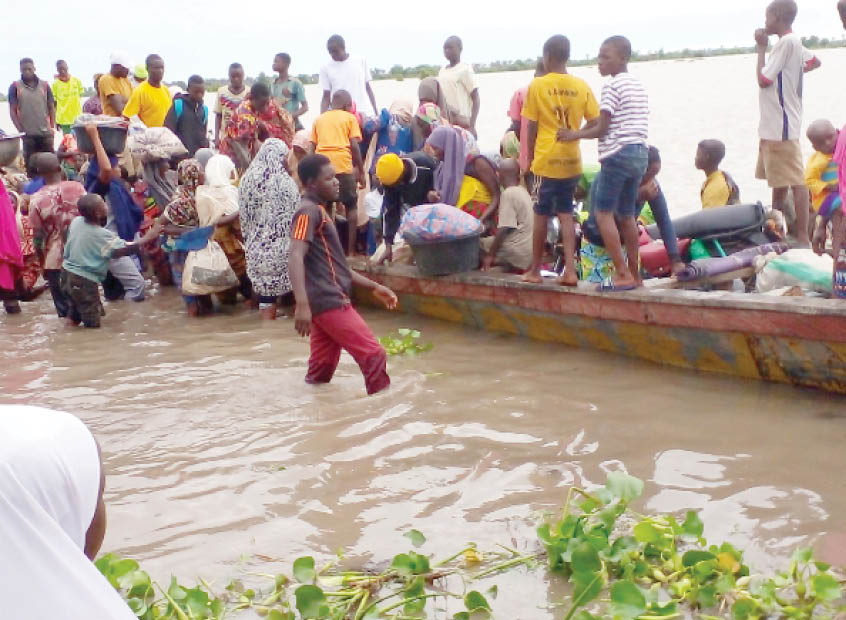Residents in communities located across rivers in Taraba State rely on inland water transportation despite lack of safety measures. Findings revealed that thousands of people travel by engine boats and canoes for economic and social activities.
Daily Trust Saturday learnt that the inland waterway is the only means of transportation because almost all towns and villages across rivers in the state lack road network.
There are six major rivers that connect many communities in nearly 10 out of 16 local government areas of the state
One of the major rivers covers about 250 kilometres and runs through Ibbi, Gassol, Lau, Wukari, Ardo-Kola and Karim-Lamido local government areas.
- 39,220 obtain 5 credits in Maths, English in NABTEB exams
- Meet Gambo Haruna, Kano widow pushing wheelbarrow to feed 6 children
Other rivers are from Taraba, Donga, Katsina-Ala, Lamurde and Wase, which flow into River Benue.
Findings by Daily Trust Saturday further revealed that these rivers provide opportunities for inland water transporters to make money, using small and big engine boats and canoes throughout the year.
Our correspondent reports that there are local jetties used as stations by water transport operators in the state. Some of the jetties are located at Mayoreneyo, Lau, Jen, Ibbi, Amar, Kanbari, Gorowa, Jalingo, Gembu, Dampar Chinkai and Jibu, among others.
It was observed that most of the operators of the inland waterways transport system do not observe safety regulation, such as providing life jackets. They also engage in overloading.
Also, there are over 20 major jetties located across seven local government areas, and in each of the jetties, thousands of passengers are transported to various destinations on a daily basis throughout the year.
Some passengers who spoke with Daily Trust Saturday said there was nothing they could do to stop the operators from overloading. They, however, said life jackets were provided for passengers for safety.
Our correspondent reports that because of lack of life jackets, many deaths are usually recorded when overloaded boats capsize.
It was gathered that the National Emergency Management Agency and Federal Fire Service recently conducted an enlightenment campaign on safety measures for inland water transporters in the state.
The campaign, it was gathered, was aimed at ensuring the safety of passengers and reducing the rate of mishaps.
Bello Zubairu, one of the passengers who travel regularly on waterways in the state, said an engine boat, which is supposed to carry 25 passengers usually carries more than 40 persons and goods at a time.
He said residents of areas located across the rivers did not have alternative means of transportation because there is no road across all the rivers in the state.
“We have no means of transportation to villages, farms and markets apart from the waterways because there is no road network across the major,” said.
A resident of Dampar also said, “It is always dangerous to travel on an overloaded boat because if it capsizes, many deaths are recorded.”
Ibrahim Dampar from Ibbi Local Government Area said, “There is the need to ensure safety measures in water transportation, but nobody regulates the system.”
He said many deaths were recorded as a result of boat mishaps around Ibbi and Dampar, along River Benue, mostly due to overloading and lack of life jackets.
“Many deaths could be avoided if passengers were provided with life jackets and overloading is avoided,” he added.
The acting chairman of the Inland Water Transporters Association in the state, Alhaji Jidda Mayoreneyo, told our correspondent that they had directed their members to avoid overloading, as well as stop night journeys. He said the measures were to reduce cases of boat mishaps and save lives.
On the issue of life jackets, Mayoreneyo explained that it was difficult to have enough to take care of all the passengers all the time.
“Life jackets are very costly. Each one costs N30,000. We cannot afford to have life jackets for all our passengers at a time,” he said.
He said the Federal Inland Water Authority provided life jackets for the association but the number was inadequately to cover the number of passengers.
Mayoreneyo, however, said life jackets were provided for operators of flying boats because they usually have few passengers at a time.

 Join Daily Trust WhatsApp Community For Quick Access To News and Happenings Around You.
Join Daily Trust WhatsApp Community For Quick Access To News and Happenings Around You.


